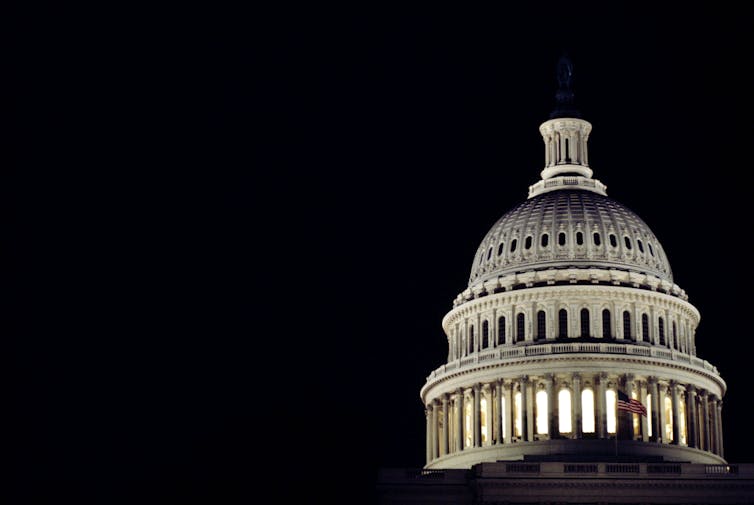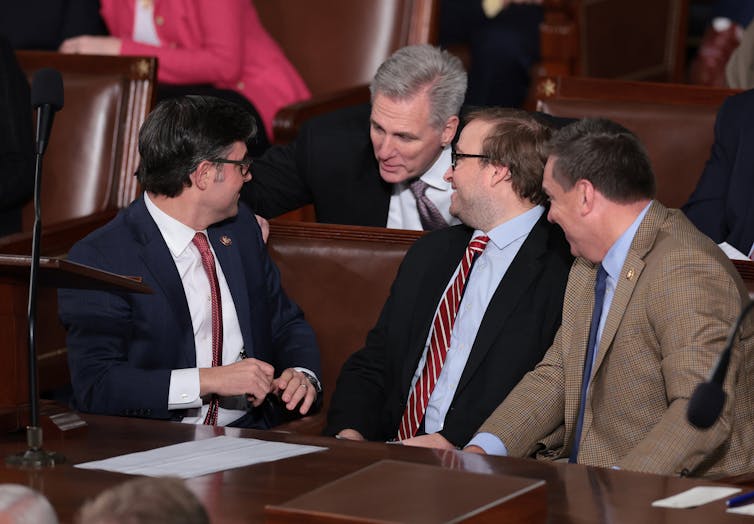Is this the least productive congress ever? Yes, but it’s not just because they’re lazy

By Charlie Hunt, Boise State University
Congress has once again been making headlines for all the wrong reasons, with multiple news outlets in recent months touting the current 118th Congress as possibly the least productive in the institution’s history. In 2023, Congress only passed 34 bills into law, the lowest number in decades.
Congress was only recently able to pass a budget bill that will keep the government open until the fall of 2024 after months of delay and stopgap measures.
As a result, House Speaker Mike Johnson’s gavel seems to be hanging in the balance yet again, as conservative Republicans revolt over his support for the bill.
Even so, the dire warnings from the media, and even from members of Congress, about the legislative branch’s lack of productivity frequently lack context and are often misleading. Let’s drill down into the numbers and see what political science has to say about it.
What makes Congress productive?
Historically, there’s been significant variation in the amount of legislating Congress does from year to year. There are a few well-understood factors that influence this, and all help explain why 2023 wasn’t ever likely to be a banner year for congressional productivity.
One obvious factor is party control of Congress and the presidency. If the Senate, House and the presidency are controlled by the same party, then there is typically more policy agreement between them, smoothing the way for easier passage of bills. Both Democrats and Republicans enjoyed what political scientists like me call “unified government” control during the most productive initial years of the Biden, Trump and Obama administrations.

There’s also evidence that election years spur more, not less, legislative productivity. Members of Congress know each other better in the second year of their term; they have dispensed with many of the ceremonial duties that begin a congressional session; and members are eager to demonstrate their legislative action to constituents during their reelection campaigns.
It’s possible that Congress will pick up its pace in 2024. Last year, Congress passed a number of stopgap funding bills, along with smaller legislation on veterans and environmental issues. But crucial issues like foreign aid, social media regulation and immigration are still on the table.
Finally, and maybe most importantly, Congress is in the best position to succeed when it’s led by competent and experienced legislators with lots of political capital.
View this post on Instagram
This hasn’t been the case so far in the current Congress. The House has had two brand-new speakers in the span of a year, and both lacked the political power, experience or acumen to command the chamber and produce passable legislation.
Speaker Kevin McCarthy, a Republican from California, was ousted in October 2023 due to lack of support within his own party. Johnson, a Louisiana Republican, has scant experience, having only served three complete terms in office.
Johnson’s job has been made even more difficult by the continually shrinking majority that Republicans have in the chamber. And rampant polarization between the two parties has made finding legislative agreement increasingly difficult.
How you measure productivity matters
Most of the media coverage of Congress’s historic lack of productivity tends to focus on the number of bills passed into law as a key measure. But this is a simplistic approach because it treats all bills as equally important regardless of substance.
Some bills that become law are purely ceremonial; for example, they rename Veterans Affairs facilities or mint commemorative coins.
Others take more substantive action, like regulating foreign trade. Others still are not just substantive, but are what policymakers dub “landmark” pieces of legislation, like the Affordable Care Act of 2010 – also known as Obamacare – or the Tax Cuts and Jobs Act of 2017.
Using the raw total of bills passed and enacted into law treats all of these as the same. More accurate counts might give less weight to, or remove, nonsubstantive legislation from the count, and give extra weight to landmark legislation.
A related issue is that the size and scope of the average piece of legislation has changed dramatically in recent decades. Congress increasingly engages in what’s called “omnibus legislating,” which combines multiple, sometimes unrelated, pieces of legislation into one megasized bill that receives one vote.
This process has led to fewer, and larger, substantive bills rather than a higher number of smaller pieces of legislation.
For example, the 2022 Inflation Reduction Act – price tag, US$800 billion – or the 2021 American Rescue Plan – price tag $1.9 trillion – only count as two bills. In prior decades, their substance would have been divided into dozens of bills.
There are other ways legislators can be productive. When today’s members introduce bills, hold committee hearings and advocate for their legislation, these actions can matter even if the bills don’t pass in the current Congress. Legislative effort undertaken today can lay the groundwork for legislative progress achieved in the future.
2023 was still a low point
All of this context is crucial for understanding whether Congress is doing an effective lawmaking job. Even so, it looks like the Congress of 2023 — particularly the House — was historically unproductive, no matter how you slice it.
Lawmakers introduced about as much legislation as usual, but due to 2023’s leadership chaos, along with the seemingly never-ending battles over the federal budget, very little of this legislation is getting any attention, much less votes on its final passage.
The 118th Congress lasts from January 2023 through the first few days of January 2025, so it still has time to make up this historic deficit. But at this point, it seems unlikely that Congress will be much more productive in the upcoming nine months than it has been for the last 15.![]()
Charlie Hunt, Assistant Professor of Political Science, Boise State University
This article is republished from The Conversation under a Creative Commons license. Read the original article.



